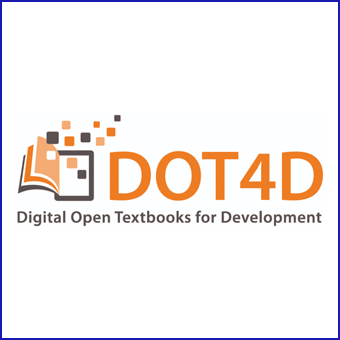
Digital Open Textbooks for Development
The Digital Open Textbooks for Development (DOT4D) project is hosted by the Centre for Innovation in Learning and Teaching at the University of Cape Town and led by Principal Investigator Dr. Glenda Cox. The project aims to investigate the current open textbook ecosystem and provide implementation support in open textbook publishing activity. It also aims to support policy-makers and other stakeholders in the development of institutional and national policy frameworks that govern open textbook publishing activity and address long-term sustainability mechanisms. Funded by Canada’s International Development Research Centre (IDRC), the project aims to contribute a developing-country perspective on the global debate around open textbook publishing.
Visit the DOT4D website at: www.dot4d.uct.ac.za
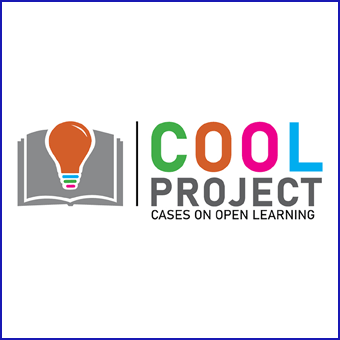
The Cases on Open Learning (COOL) Project
The Cases on Open Learning (COOL) research project is an initiative by the Department of Higher Education and Training (DHET) in partnership with the Centre for Innovation in Learning and Teaching (CILT) at the University of Cape Town (UCT). The COOL project is led by Principal Investigator, Dr. Tabisa Mayisela.
The COOL project seeks to investigate the uptake of what DHET refers to as ‘open learning’ in in the South African tertiary education sector, including recognition of prior learning, disability access, collaboration, professional development, blended learning, flexible learning, multilingualism, open education resource adoption, and micro-credentialing. The COOL project also aims to support DHET in the development of the Open Learning Policy Framework for Post-School Education and Training that will govern open learning in South Africa and contribute to opening up teaching and learning opportunities as a way to make education more socially just.
Visit the COOL Project at: http://www.cilt.uct.ac.za/cilt/cool-project
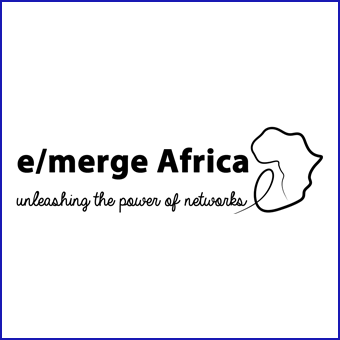
e/merge Africa professional development network
e/merge Africa is an educational technology network that is mostly for educational technology researchers and practitioners in African higher education. In early 2014 e/merge Africa started offering regular professional development activities in the form of online seminars, workshops, and short courses. You are invited to join our Facebook group, use the short contact form or mail us at info@emergeafrica.net. If you would like to lead a seminar, workshop or short course please send us a proposal.
Visit the e/merge Africa website at: www.emergeafrica.net
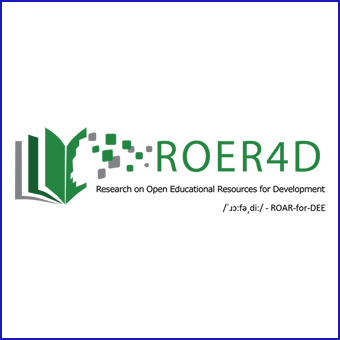
Research on Open Educational Resources for Development (ROER4D)
The Research on Open Educational Resources for Development (ROER4D) project was a five-year (2013–2018), large-scale networked project led by Principal Investigator Assoc. Prof. Cheryl Hodgkinson-Williams. It set out to contribute a Global South research perspective on how open educational resources can help to improve access, enhance quality and reduce the cost of education in the Global South. The project engaged a total of 103 researchers in 18 sub-projects across 21 countries from South America, Sub-Saharan Africa, and Asia, coordinated by Network Hub teams at Wawasan Open University in Malaysia and the Centre for Innovation in Learning and Teaching at the University of Cape Town, South Africa. The project was funded by Canada’s International Development Research Centre.
- Visit the ROER4D website
- Access the ROER4D content collection
- Access the ROER4D open data collection
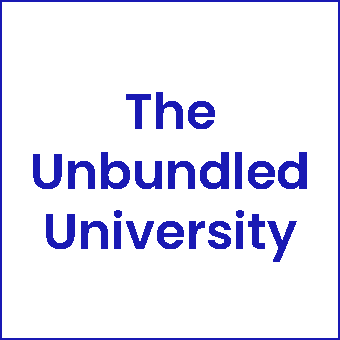
The Unbundled University: Researching emerging models in an unequal landscape
Profs Neil Morris and Laura Czerniewicz, from the universities of Leeds and Cape Town respectively, served as the Principal Investigators on the 26-month project ‘The Unbundled University: Researching Emerging Models in an Unequal Landscape’, from October 2016 to November 2018. Also on the team are Carlo Perrotta, Bronwen Swinnerton and Mariya Ivancheva from the University of Leeds and Alan Cliff, Sukaina Walji and Rebecca Swartz from the University of Cape Town. This project examined the profound confluence which constitutes the unbundled university – the intersection of increasingly disaggregated curricula and services, the affordances of digital technologies, the growing marketisation of the higher education sector itself and the deep inequalities which characterise both the sector and the contexts in which they are located.
Visit the Unbundling project website at: https://unbundleduni.com/
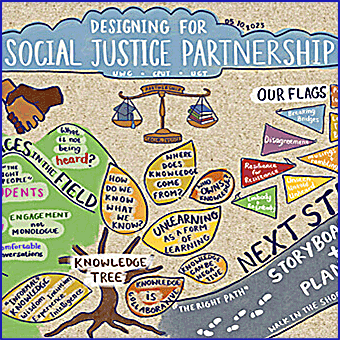
The Designing for Social Justice Partnership (DSJP) Programme
The Designing for Social Justice Partnership (DSJP) Programme provides staff-student teams with the opportunity to co-create/co-design courses and to promote the scholarship of learning and teaching (SOTL) through co-designing, conducting, and publishing research on the effectiveness of these co-created designs. This model emphasises the cultivation of an academic community, a spirit of open collaboration, forward-thinking and socially just design principles, to be shared across educators and students from multiple institutions. In the long run, the DSJP programme seeks to expand the capacity of educators in South Africa through a regional student as partners network and beyond to embrace social justice in the design and delivery of courses, while simultaneously increasing student success and advancing convergent research on its implications and long-term effects.
